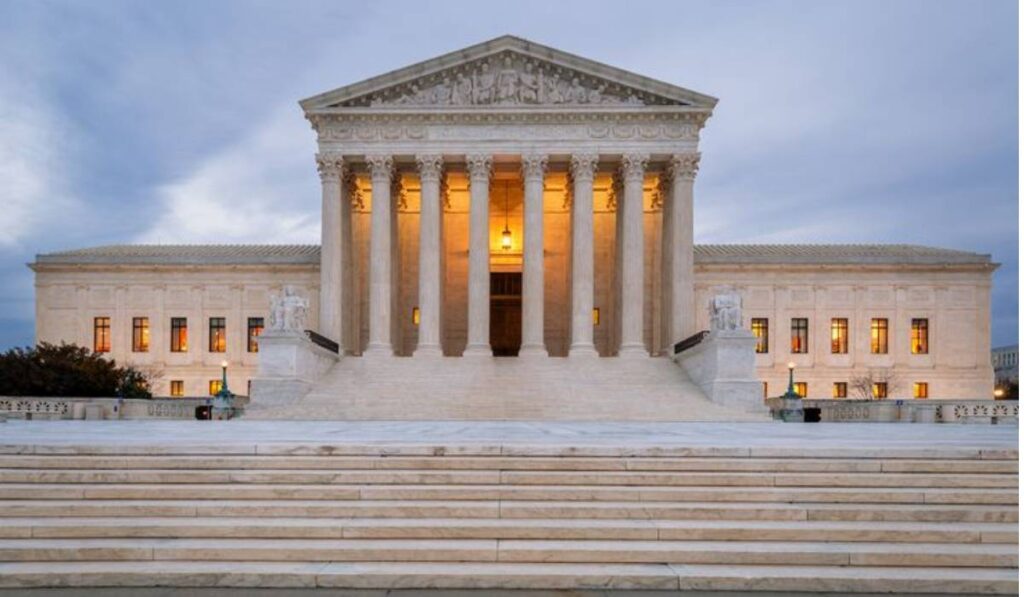
On Monday, most Supreme Court justices expressed skepticism of claims that the Biden administration went overboard by telling social media platforms to remove problematic content.
A federal judge’s injunction, currently on hold, prevents contact between government officials and social media companies on a wide range of issues.
During oral arguments, justices across the ideological spectrum wondered whether the conduct of government officials was unlawful. And whether plaintiffs could prove there was direct harm.
One of the issues that came up was the lack of evidence that proves there were threats of punitive action against uncooperative social media companies. The case was one of two that came before the court on Monday about the practice known as “jawboning.”
Jawboning is a case where the government leans on private parties to do what it wants. And sometimes, there is the implicit threat of consequences if demands are unmet.
Those challenging the government’s actions say that there was a clear violation of the First Amendment, which protects free speech rights, in each case.
The second case involves claims that a New York state official pressured companies to end ties with the NRA. Republican attorneys general in Louisiana and Missouri, as well as five social media users, filed the underlying lawsuit.
They alleged that U.S. government officials went too far in pressuring platforms to moderate content. The individual plaintiffs include Covid lockdown opponents and Jim Hoft, the owner of the right-wing website Gateway Pundit.
The lawsuit makes various claims relating to activities from 2020 and before. These include efforts to deter the spread of false information about Covid and the presidential election. Donald Trump was president at the time. However, the district court ruling focused on actions taken by the government after Joe Biden took office in January 2021.
Several justices questioned whether the nature of the communications was problematic. Liberal Justice Elena Kagan noted that officials sometimes have strained communications with journalists.
“This happens literally thousands of times a day in the federal government,” she said.
Chief Justice John Roberts, a conservative, also pointed out that the federal government is “not monolithic.” So, a complaint from one department doesn’t mean another agency would take action if a post was not removed. “That has to dilute the concept of coercion significantly, doesn’t it?” he said.
Justice Amy Coney Barrett indicated that Louisiana Solicitor General Benjamin Aguiñaga’s argument that mere encouragement by the government could constitute unlawful conduct “would sweep in an awful lot” of routine activity.
Aguiñaga believes the government’s conduct could cross the line. But only if it goes beyond expressing concerns about content to asking for posts to be removed.
POLL—Should the Government Implement Stricter Penalties To Combat Retail Theft?
The justice who seemed the most sympathetic to the plaintiffs’ plight was conservative Samuel Alito. The evidence is proof that White House officials suggested they were on the “same team” as the social media companies. Then they demanded answers and “cursed them out” when they did not get the responses they wanted, Alito said.
“There is constant pestering of Facebook and some of the other platforms,” he added. “I cannot imagine federal officials taking that approach to the print media representatives over there. If you did that to them, what do you think the reaction would be?”
Last July, Louisiana-based Judge Terry Doughty restricted officials from communicating with social media companies or urging the removal of content containing protected free speech.
The New Orleans-based 5th U.S. Circuit Court of Appeals narrowed the scope of Doughty’s injunction. However, the appeals court still required authorities not to “coerce” social media companies to remove content considered misinformation.
The Supreme Court agreed to hear the case, but in October, it blocked the appeals court ruling. In the NRA case, the gun rights group claims that Maria Vullo, then-superintendent of the New York Department of Financial Services, violated its free speech rights.
The court ultimately found that Vullo inappropriately pressured insurance companies to end their business relationships with NRA. Vullo’s office had been investigating insurance companies that the NRA had worked with to provide coverage for members.
ALSO READ: Study Reveals More than Six Million Americans Do Not Have Homeowners’ Insurance
According to the NRA, Vullo, in meetings with insurance companies, made “back channel threats that they cease providing services to the NRA.”
Speaking out after the 2018 school shooting in Parkland, Florida, Vullo also urged insurance companies and banks to reconsider relationships they had with gun rights-affiliated groups.
Alito believes the only difference between the two cases is that Vullo was not subtle enough in her interactions with the companies. “Does that mean that really the New York officials could have achieved what they wanted to achieve if they hadn’t done it in such a ham-handed manner?” he asked.
You Might Also Like:
Black Men Tortured, Wrongly Charged by Mississippi Officers Call for “Stiffest of Sentences”
Legal Experts Say Mike Lindell’s New Supreme Court Evidence Is Bound to Fail
Chicago Enforces Controversial Policy, Evicts Migrants From Shelters
Biden Suffers Blow As Supreme Court Allows Texas To Arrest Illegal Migrants From the Southern Border
President Joe Biden’s Campaign Announces Raising $53 Million in February
